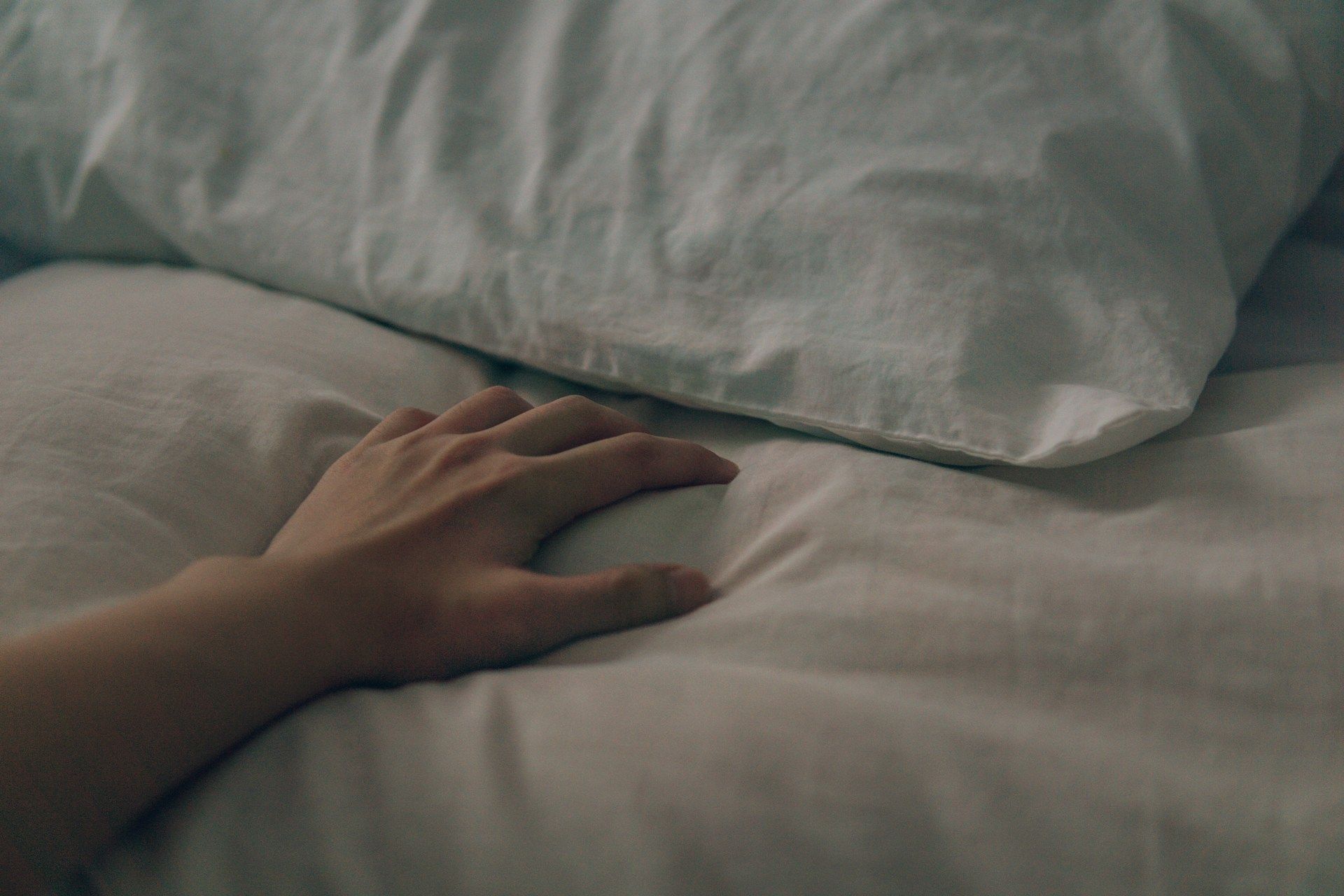How To Stop Your Hands Going Numb While You Sleep
Written by Michael Angelo, PT

Waking up with numb or tingling hands? You’re not alone and you’re not imagining things.
That strange pins-and-needles sensation is more common than most people think. In fact, around one-third of adults experience hand numbness during sleep (Roth et al., 2017). While it can feel alarming, it’s often caused by something simple like nerve compression from your sleeping position.
In this guide, we’ll break down why your hands go numb at night and what you can do to stop it, so you can finally wake up feeling rested, not uncomfortable.
What Causes Numbness In Hands While Sleeping
Numbness in fingers while sleeping (also known as pins and needles) is usually caused by nerve compression, nerve damage, or another impact on your nerves.
Your hand goes numb or tingly to let your body know something is wrong — i.e., your nerves are compressed because you’ve slept on your hand.
Other causes of waking up with numb hands and arms include:
- Sleeping position
- Carpal Tunnel Syndrome
- Peripheral neuropathy
- Cervical spondylosis
- Restricted blood flow
- Diabetes Mellitus
How Do I Stop My Hands Going Numb While I Sleep?
1. Adjust Your Sleeping Position
Did you know some sleeping positions are more likely to cause numb hands than others?
Studies show that side sleeping is less likely to cause nighttime numbness and tingling (Bettlach et al., 2016). This is because you’re less likely to compress the nerves in your hands and arms.
However, it’s critical to maintain a proper side sleeping posture to protect your back and spine. A memory foam knee pillow can assist in maintaining this position.
2. Stretching and Wrist Braces
Gentle stretching can help decrease nerve stiffness and pain sensitivity, leading to less numbness and tingling at night (Thomas et al., 2021).
For example, a wrist flexor stretch is a popular choice. With this stretching technique, you extend your affected arm with your palm facing down. Then, gently bend your wrist and point your fingers up until you feel a mild to medium stretch in your forearm. You must hold this for 15 to 30 seconds before releasing it.
Likewise, wrist braces can reduce numbness by adding extra support and reducing awkward positions or the likeness of overnight compression.
3. Ergonomic Pillows and Mattresses
Sleep aids are an excellent way to get better rest, and they can even help reduce any tingling or discomfort in your hands while you sleep.
Supportive yet soft betting (usually made from memory foam) reduces stress on your pressure points by distributing your bodyweight and moulding to your body shape.
The Original Groove Pillow is a memory foam pillow designed to provide pain relief, spinal support, and helps to maintain proper posture while you sleep.
Perfect if you’re looking for a specialised memory foam pillow to reduce pressure while also helping you stay in a healthy side sleeping position.
You may also want to explore memory foam mattresses for full body support.
Shop Groove Memory Foam Pillow
The Takeaway
Nighttime hand numbness might seem minor, but it can disrupt your sleep and leave you feeling off the next day.
In many cases, it’s easy to improve with simple changes, like adjusting your sleeping position, adding stretches to your routine, or upgrading your pillow.
If symptoms persist or worsen, don’t ignore them. Talk to your doctor to rule out any underlying conditions.
With the right sleep setup and a bit of care, you can take control of nighttime numbness—and wake up feeling like yourself again.
When to Consult a Doctor
If the numbness in your hands doesn’t resolve after a few weeks, becomes more common, or starts to impact your daily life, you should consult a doctor for a professional check-up.
Numbness and tingling in the hands are usually nothing to worry about. However, in rare cases, they can indicate a more serious condition (Mayo Clinic, n.d.).
Signs to watch out for include:
- Persistent numbness
- Numbness accompanied by pain
- Muscle weakness
If you haven't noticed an improvement after making at-home changes or are experiencing the symptoms listed above, you should see your medical provider.
About The Author
Michael Angelo, PT, DPT, CFMT is a Physical Therapist in Tucson, Arizona, USA.
He got his Doctorate of Physical Therapy from Northeastern University in Boston Massachusetts and is passionate about manual therapy and helping patients bridge the gap between recovery and return to their optimal activities.
He currently lives with his wonderful wife and three elderly dogs who all enjoy camping, hiking, and anything in the outdoors.
References
- Bettlach, C.R., Yu, J., Hasak, J., Bodway, G. and Mackinnon, S. (2016). Abstract. Plastic and Reconstructive Surgery - Global Open, 4, pp.123–124. doi:https://doi.org/10.1097/01.gox.0000503043.97116.f6.
- Mayo Clinic. (n.d.). Numbness in hands Causes. [online] Available at: https://www.mayoclinic.org/symptoms/numbness-in-hands/basics/causes/sym-20050842.
- Roth, C.L., Hasak, J.M., Krauss, E.M., Yu, J.L., Skolnick, G.B., Bodway, G.N., Kahn, L.C. and Mackinnon, S.E. (2017). Preferences in Sleep Position Correlate With Nighttime Paresthesias in Healthy People Without Carpal Tunnel Syndrome. Hand, 14(2), pp.163–171. doi:https://doi.org/10.1177/1558944717735942.
- Thomas, E., Bellafiore, M., Petrigna, L., Paoli, A., Palma, A. and Bianco, A. (2021). Peripheral Nerve Responses to Muscle Stretching: A Systematic Review. Journal of Sports Science and Medicine, 20(2), pp.258–267. doi:https://doi.org/10.52082/jssm.2021.258.

